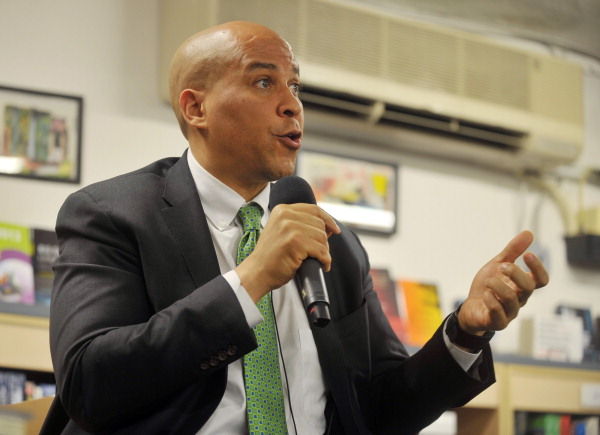By Philip Sean Curran, Staff Writer
U.S. Sen. Cory Booker (D-NJ) was in Princeton on Monday talking about race, privilege and the challenges facing the country — issues he has confronted in and out of public life.
Inside Labyrinth Books, he recalled his family struggles to move into a white neighborhood in Bergen County and of the travails of dealing with the steady flow of violence in Newark as mayor of the state’s largest city.
“There is this anguish that I wrestle with about having this faith in our nation that is so deep and a love of country that is so deep, that I feel an anguish at the work that’s yet to be done in our nation,” he said.
Mr. Booker was in town plugging his book, “United,” a 223-page part memoir, part commentary on issues like incarceration and what he has termed a “broken criminal justice system.” He spoke to a standing-room audience of roughly 275 to 300 people, with some listening by audio in overflow, for the latest stop on his book tour.
He singled out Cornel West, sitting in the front row, as a “formative figure” in his development as a young man and later as a confidant. Later, he and Princeton University professor and friend Eddie Glaude spoke in conversation, with Mr. Booker later taking audience questions.
In his remarks, he recalled how his father and mother, Cary and Carolyn, “made it clear what got me to where I was.” Mr. Booker said his now late dad was born in the Jim Crow South, someone who had a “tough childhood” and never knew who his father was.
By contrast, he lived a privileged life: good in sports, good enough academically to attend some of the world’s best colleges. Mr. Booker played football at Stanford University, was a Rhodes Scholar and went to Yale Law School wanting to be a “crusading attorney.” He moved to a rough section of Newark.
“It was dangerous, it was scary,” he recalled. “But it was a tense, very difficult place. And I found incredible people, African American women all of them, who basically adopted me.”
Mr. Booker, 46, got involved in city politics, was elected a councilman, defeated in his first run for mayor in 2002 and victorious in his second attempt four years later. In 2013, he won the race to fill the unexpired term of the late Sen. Frank Lautenberg and in 2014 was re-elected to a full six-year term.
Mr. Booker said he that he went to Washington setting out not to be a Democratic senator “but to be a senator who could deliver things, get things done.” He sought to reach out to his Republican colleagues in the divided chamber.
“I get frustrated that the government, my government that I’m a part of, that we’ve established in our country, is not representing this understanding that the most valuable natural resource in this country is not oil, gas, coal. It’s each other, it’s us, it’s our children,” he said.
He was critical of the war on drugs, and said more non-violent drug offenders are in prison today than all the people who were in prison in 1975. Of national politics, he said none of the presidential candidates would be able to “ride in and solve the challenges we have.”
“There has to be an expansion of our moral imagination of who we are,” Mr. Booker said, “followed by a courageousness of action that we’ve seen in so many points in our history for us to begin to be who I know we are already.”

